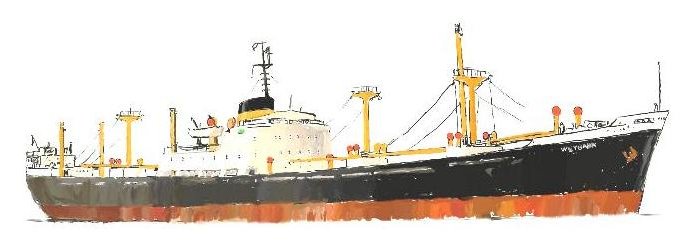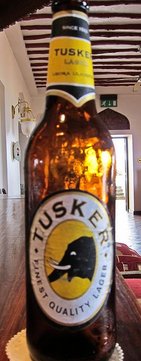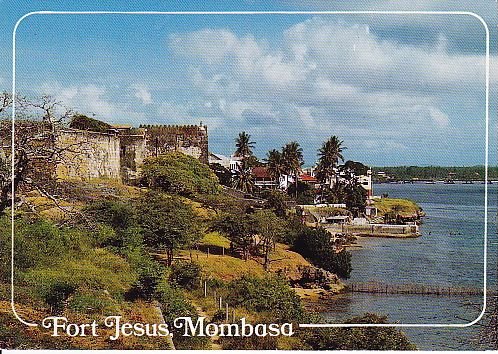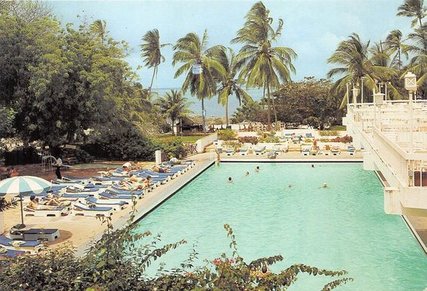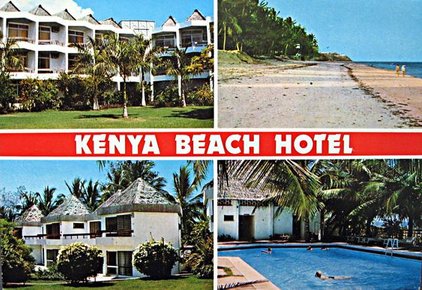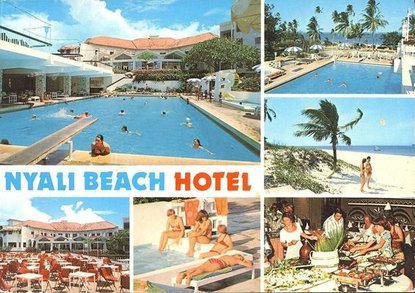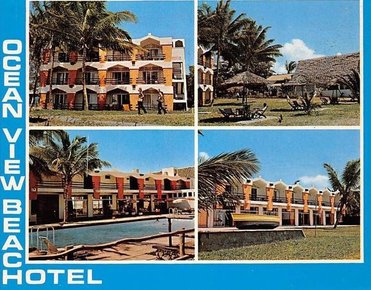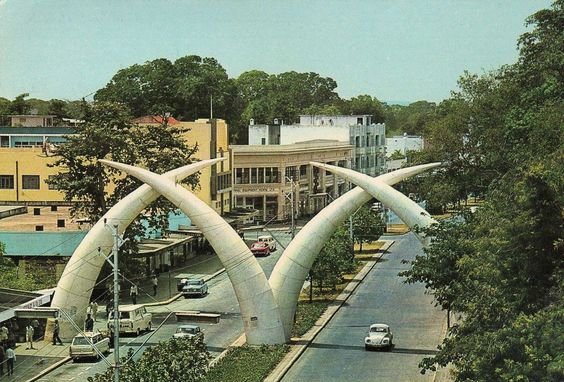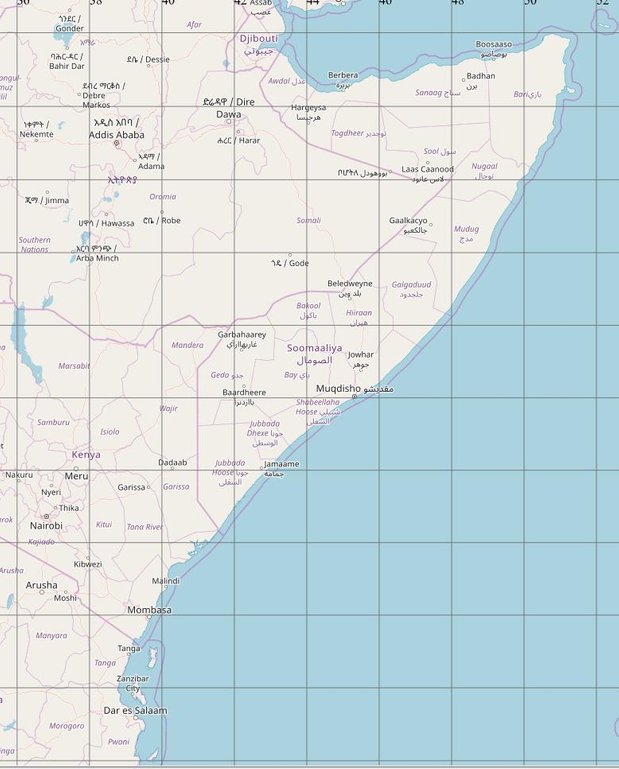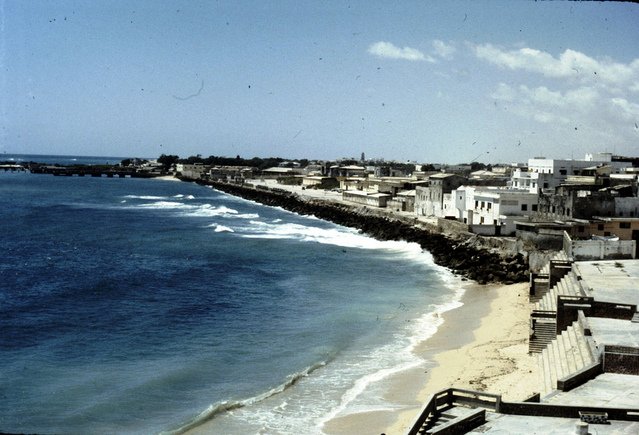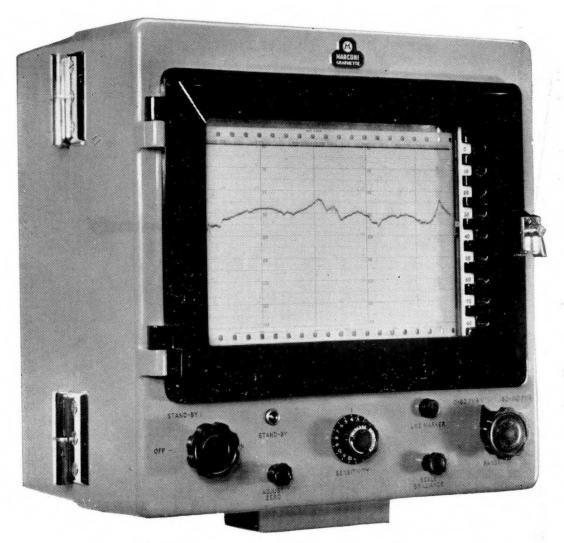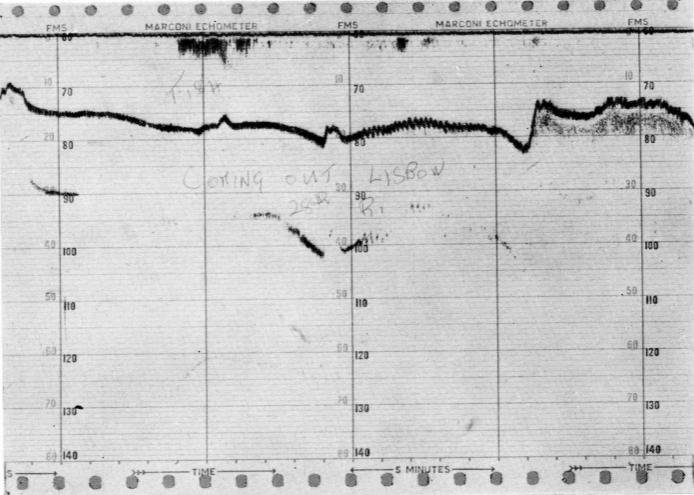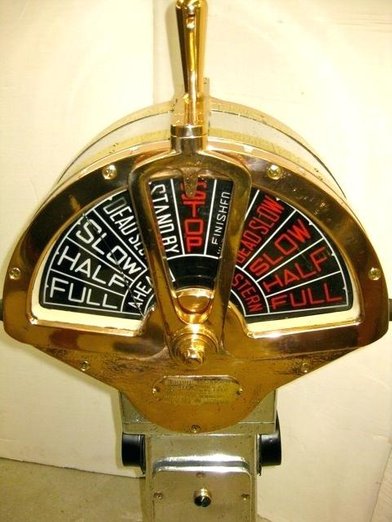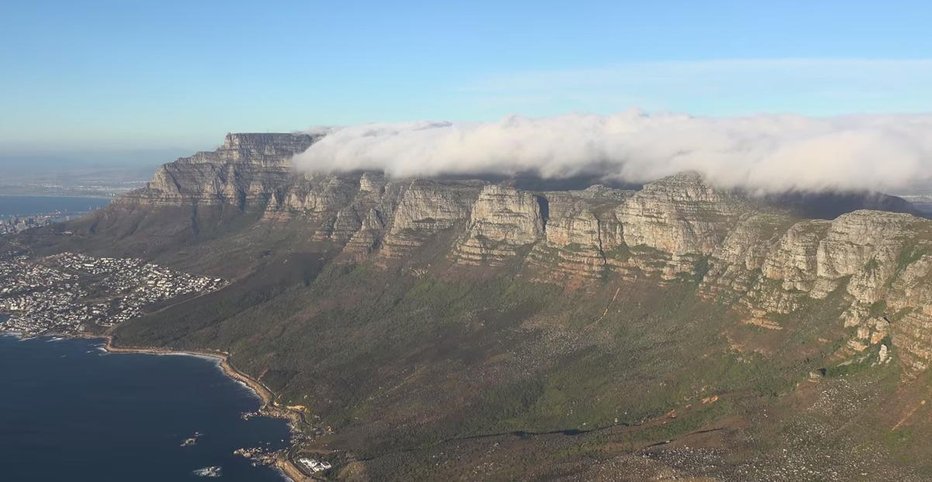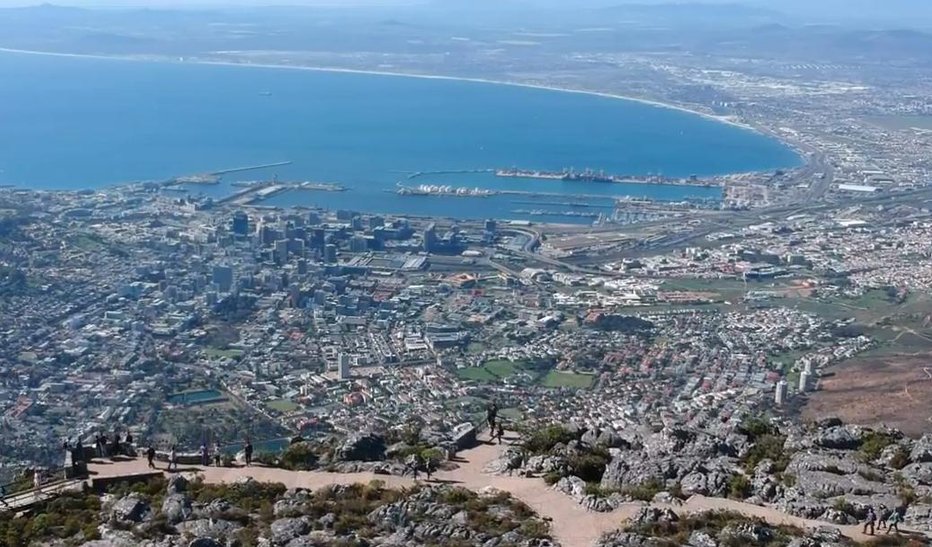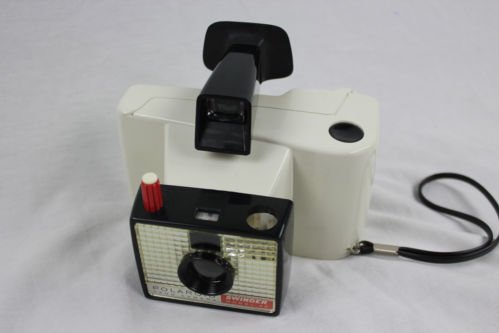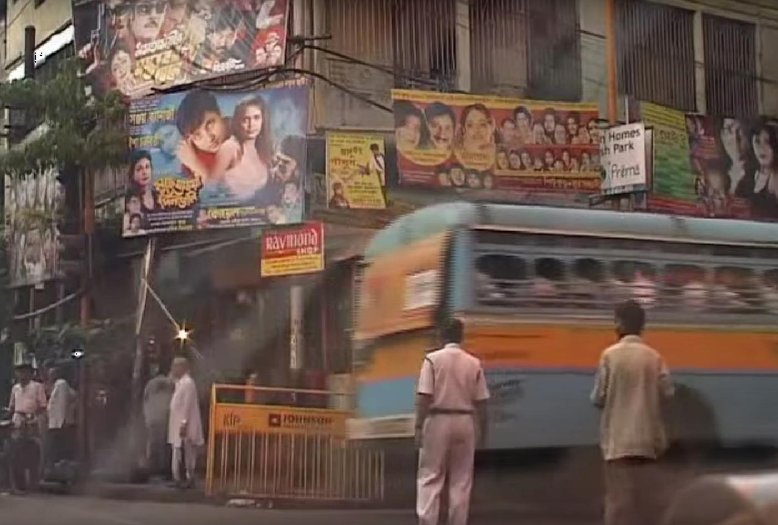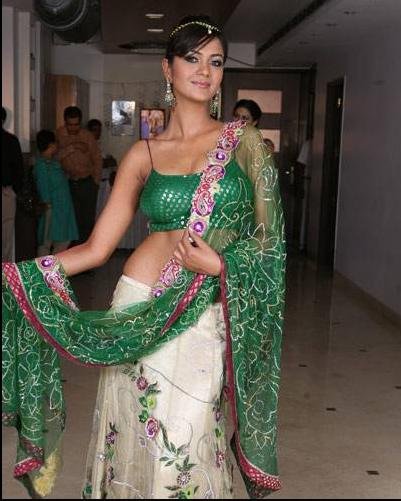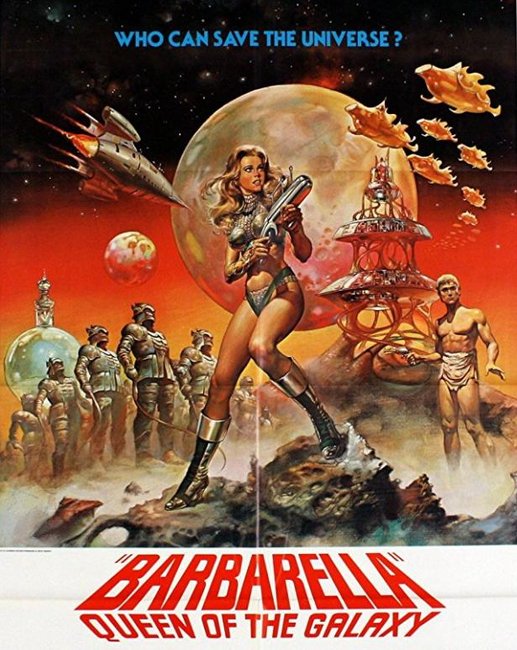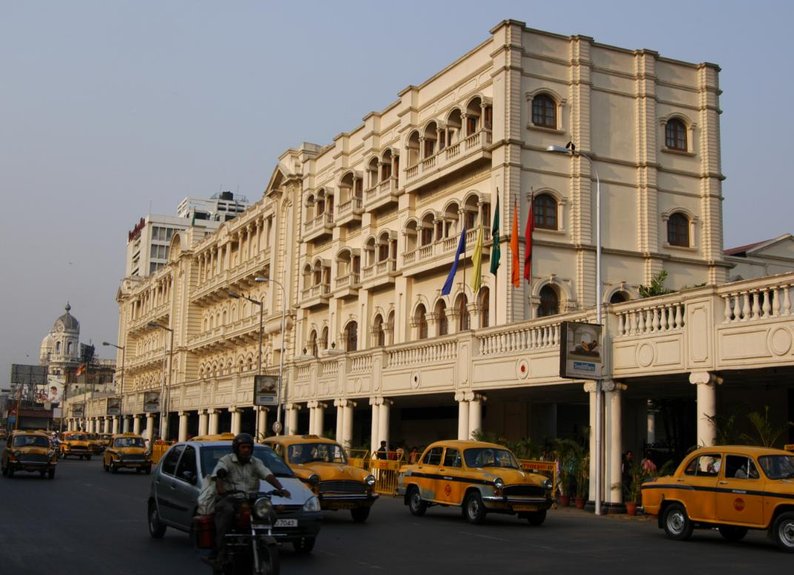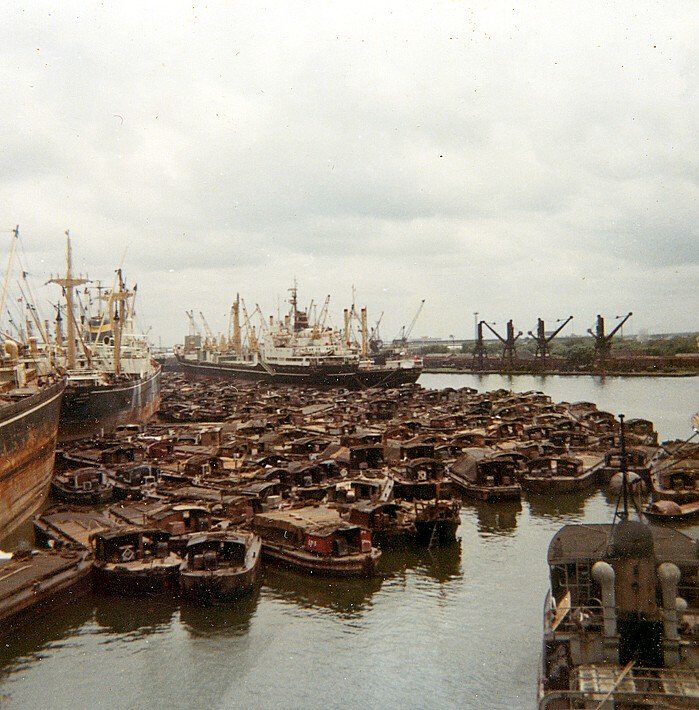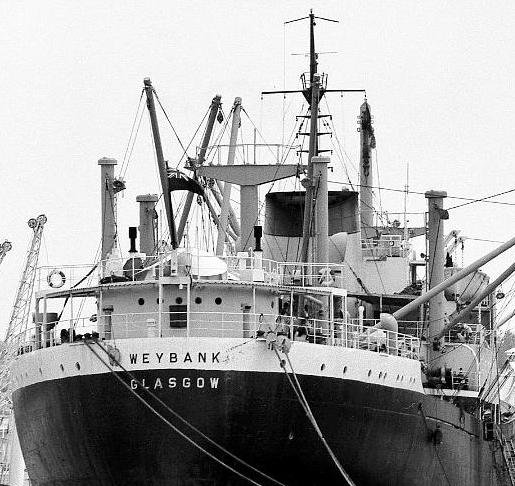Mandalay
M.V. Weybank - Chapter 6
Mombasa
On one occassion on our arrival at Mombasa I decided to pay a visit to the Marconi depot. A Marconi depot was an office where we could obtain spare parts for the radio and radar equipment to replenish those that we had used up at sea from our own board supplies (there were not that many Marconi depots in East Africa - there was one in Mombasa, Dar es Salaam, Durban and Capetown). I had recently replaced the magnetron (main transmitting valve) in our radar from my on-board spares and needed a new spare one to replenish it.
Before continuing with the visit, first some relevant information:
My monthly salary was transferred by Marconi to my UK bank account which as you can imagine wasn't much use to me if I wanted to go ashore in other parts of the world but Marconi, realising that they couldn't just leave their R/Os pennyless, issued us with a "paybook" about the size of a standard letter envelope. I say "paybook" because the front cover (thin light-brown cardboard) only displayed "The Marconi International Marine Communication Co., Ltd." followed underneath by "No. ......." and then "Name..........." (yes, we had a number just like in the army). Only when opening up the book was its purpose divulged - ADVANCES.
It contained 12 PINK coloured pages in tabular form printed on both sides giving a total of 24 pages.
Under the title ADVANCES each page was divided into 5 columns labeled:
Date of Advance///PORT///Amount Paid in Foreign Currency///Sterling Equivalent/// CAPTAIN'S or PURSER'S SIGNATURE (or COMPANY'S REPRESENTATIVE). For "Company's Representative" read Marconi Depot or Marconi Depot Agent.
Underneath were 7 horizontal segments, one for each port.
At the bottom of each page the following idiotical statement was printed "In the event of the Radio Officer not having received an advance the word "Nil" should be inserted by the Captain and his signature appended".
What the "paybook" did not state was that an R/O was only permitted to draw a maximum of 12 Pounds Sterling per month and to be able to draw any money at all you had to be in a port with a Marconi depot.
I fortunately had my UK bank cheque book and if I wanted any money to go ashore with I just went to the Captain who, God bless him, always took and cashed my cheques without any hassle.
Returning to my proposed visit to the Marconi depot, since I was going there in the first place I thought I may as well take along my "paybook" with me. Who do you think popped up just as I was going ashore? Right! Who else but Donald? "Going ashore, Sparks?". "I'm only going to the Marconi depot" (after all it was only 10 a.m. in the morning). "Got nothing better to do, I'll come along with you". "Thanks so much Donald, what would I do without you, I'm honoured with your company".
Off we trundled to the Macaroni office. Once we got there I had no trouble getting the magnetron but when I then produced my "paybook" with a "rabbit out of the hat" flourish, the depot manager's face went blank. "I'd like a 12 PS (Pounds Sterling) advance paid out in Kenyan Shillings if you don't mind". He took my book and then sat down with it behind his desk. I could see his eyes scanning for when I had last received an advance in the hope that it was less than a month ago - no chance! He then started scribbling on a piece of paper and then announced "I can only give you 180.- Kenyan Shillings which is PS 10.5 - that's all I've got in the kitty at the moment". "That'll do fine" said I (dated and stamped 18.12.1968 in my paybook). (In 1968 the value of the PS was high, in Germany for instance the exchange rate was PS 1.00 = DM 12.00).
Donald who had been present the whole time (I didn't have the heart to tell him to wait outside) and having registered that I was now the proud owner of KS 180.- enquired hopefully "where to now, Sparks?"
to which I answered "back to the ship!" He of course after almost a year just about knew me better than I myself. It was by now just past noon when we hit the streets and it was hot. After a hundred yards or so we both started scanning - where to find a nice ice-cold Tusker beer? "Mad dogs and Englishmen drink in the noon day sun". So do Scots.
"Contact!" - there, across the road, an open-fronted shanty bar inclusive "deep in Africa" music and three or four of Kenya's finest ladies beckoning us with rythmic seductiveness to join them. It's a "no brainer" - across the road we shoot leaving our brains behind us.
Since leaving the depot I had been carrying the magnitron in a box which was an awkward 1 foot square and heavy. As soon as I got into the bar I dumped it in front of me as I took a seat on a bar stool. "Jambo Bwana - two ice-cold Tuskers por favor!". Immediately the ladies are around us, jockeying for the best position to intercept. Two of them are really attractive and normally if you looked one of them in the eyes too long you were just about done for. However, like everywhere else in life there appeared to be a hierarchy amongst them and one of the lesser attractive latched onto me and in Kikuyu, or whatever language she spoke, told the others to "F..k Off, he's mine!". Donald in the meantime was only concerned with keeping his fuel intake level as high as possible (like a jet fighter refuelling from an airborne tanker) before I pulled the plug (I was the banker) and was batting the lovelies away with Highland gibberish - "My Shishter is blacker than yew".
In the interim my "hostess" was pulling the chocks away. The usual "what's your name?" "Where you come from?" (answer "Nairobi" - "Nairobi? What you do in Mombasa?" - answer "The girls here are prettier") foreplay went to the next level. "You handsome (she's not going to say "You are so ugly") - I like you much - you come my place I make you happy". She is wearing a thin cotton dress and before I can react she has grabbed my arm and placed my hand up under her dress on her naked crotch.
She wasn't the most attractive but she was by no means ugly either. The most danger a seaman can face is in my opinion a combination of alcohol and women. The more alchohol, the less the inhibition and the more attractive the woman.
My "hostess" after having being told to "knock it off" wasn't giving up. She started tugging at my shirt trying to pull me off the bar stool - "you come with me!" She was getting aggressive and I kept pushing her away until suddenly she grabbed the magnetron from the bar top and immediately ran out of the bar and across the road where she then held it up with a "come and get it" motion.
If she had just pinched KS 30.- from me I would have let her run but a magnetron was a VERY expensive item and if it just disappeared into thin air I would have had a lot of explaining to do with Marconi.
So, off I shot across the road after her - she didn't wait - she shot off in the opposite direction which I realised after about 10 meters had turned into a dirt track. Another 100 meters and I was suddenly in the middle of a shanty village and there she stood with one arm around the magnetron and with the other beckoning me forward.
This had of course not gone unnoticed by the locals who started to appear in the periphery. The movie "High Noon" comes to mind but it was more like "Grace Muzwinga v. Allan Stupid" - not OK at the OK Coral.
She then, fully aware of spectator support gave me an ultimatum - "Me or box?". I was now in a very difficult situation because nothing can be worse than a woman scorned but she turned out to be a very astute capitalist and we agreed on a sum for "the box". Not only that but I started to like her because she could have at any time shouted "Help! Help! He try rape me" in Kikuyu or whatever and I would have been mincemeat. My affection for her grew when after the "transaction" she said to me "come, I take you back to bar, have drink together" - I almost answered "no, let's go to your place instead".
Donald (remember him?) was in a comatose state still perched somehow on his barstool with his face doing a microscopic survey of the occasional ant running along the bar surface. The other bar girls were sitting around in boredom - they had probably fleeced Donald but found him full of empties. What barkeeper joy when I reappeared on the scene - "only 20 Shillings Bwana!".
Mombasa
R&R -Rest & Recreation in 1968- how to spend your free time in Mombasa?
Apart from initially visiting the Old Port and Fort Jesus (built by the Portuguese) and a few other landmark sites the thing to do was to head off to the beach by taxi to the beach hotels. I used to visit three of them which were the Ocean View Beach Hotel, the Kenya Beach Hotel and the Nyali Beach Hotel each of which had a swimming pool and a strip of beach and bars of course! On many evenings they also hosted dances (at least that's what they advertised them as!). They were great places to hang out in the afternoon at the pool where you now and again got to ogle such beauties as bikini clad airline stewardesses when their flights came in from London or Frankfurt and they came down from Nairobi - and dream about being a pilot and not a lowly R/O.
Above are postcards from the late '60s early '70s of the beach hotels. The one on the top left is also of the Nyali.
The only beauties that we could get close to (but as close as you wanted!) were the swarms of them that hung out in the bars and "nightclubs" in Kilindini Road (yes, the same road with the famous aluminium elephant tusks spanning both traffic lanes. These had been errected in 1952 to impress Princess Margarine - sorry, Margaret on her impending visit. She was on a tour of East Africa at the time, arranged I think to get her out of the way and cool down after her affair with Peter Townsend. On her departure the tusks were supposed to be dismantled but by popular demand they remained (up you, Margaret!) - to this day).
Below a photo of Kilindini Rd. as it looked in the late '60s early '70s.
In Kilindini Road I visited the "Casablanca", "Penguin", "London Bar" and the "Sun Shine Club and Bar". They were all more or less in the same category as "cattle market disco night in the coal mine".
These bars were generally open 24 hours a day but when the sun went down artillery barrage duels opened up and got progressively louder as the night went on. "And the Kilindini Road Night Cup goes once again to last night's winners - the Sun Shine's "Uhuru Boomers"".
This was in an era long prior to the arrival of "Saturday Night Fever". John Travolta had not yet been born or if he had been he was still in his daipers. I think however that the producers of the movie got their inspiration from the Kilindini Road.
What excitement when entering! The throbbing beat of some African love or war dance. Immediately surrounded by a bevy of Kenyan beauties, their hands gliding expertly under my shirt, tickling my ears, hands through my hair, their bodies pressed close exploring my nether regions, the overpowering smell of perfume, their endearments, bodies seductively swaying to the rythme.
From the recess of my mind I start getting Defcon III signals like "where did you hide your money, idiot?!". "Break, break! This is STUPID1, heavy triple Alpha! NAV systems down". "Roger STUPID1, this is tower control BRAIN1, turn 180°, reduce airspeed to 300 kts, await further instruction, Out!".
The only successful way to break was to diplomatically? fight off the ladies with "I go home now, go work tommorow" or to the more persistent, "F... Off!". If it was the Sun Shine bar you could grab a Tusker beer and then go out onto the pavement (the bar was open faced to the street), have a couple of smokes with your beer and then rejoin the battle in the knowledge that your fans had long since homed onto the next candidates.
The clientele of these bars was half Kenyan, half international. Who knew where they all came from or what they were seeking? Most I guess were seeking sex in one form or another and the cheaper the better.
I felt so sorry for these bar girls. Just about all they had were the clothes on their backs and any money they made was spent in supporting their fathers, mothers and siblings to survive. They had to put some of their earnings towards "keeping up appearances" - a new cheap dress to catch the eye, makeup, some glitzy trinkets, cheap (not for them) perfume, learn as much English as they could. Competition was fierce and so was their fear of catching VD.
I visited these bars, one after another only once. I was hoping to find a bar with some "ambience". No pulsating 100 Decibel brain lobotomy - instead a quiet pub with background music (some slow teary-eyed country & western to make me even more homesick), Tusker beer, maybe a small menu with grilled shrimp snacks or whatever, even the girls would be most welcome - "take a seat honey, what would you like to drink?". "Yeah! Dream On!"
Mogadishu
Mogadishu? "Rings a bell! Where's that?". Around 350 sea miles up the coast from Mombasa, that's where:
First a short intro. to the "State of the Nation":
In 1905, Italy made Mogadishu the capital of the newly established Italian Somaliland.
Thousands of Italians settled in Mogadishu. In the 1930s, new buildings and avenues were built. A 114 km (71 mi) narrow-gauge railway was laid from Mogadishu to Jowhar. An asphalted road, the Strada Imperiale, was also constructed and intended to link Mogadishu to Addis Ababa.
In 1940, the Italo-Somali population numbered 22,000, accounting for over 44% of the city's population of 50,000 residents. Mogadishu remained the capital of Italian Somaliland throughout the latter polity's existence. In World War II it was captured by British forces in February 1941.
After World War II Mogadishu was made the capital of the Trust Territory of Somaliland, an Italian administered political entity under the ONU mandate, for ten years (1950–1960).
British Somaliland became independent on 26 June 1960 as the State of Somaliland, and the Trust Territory of Somalia (the former Italian Somaliland) followed suit five days later. On 1 July 1960, the two territories united to form the Somali Republic, with Mogadishu serving as the nation's capital.
When we arrived on the scene in 1968 aboard the Weybank, Somalia was peaceful but as you can read below things were about to change and they were never to be the same again.
On 15 October 1969, while paying a visit to the northern town of Las Anod, Somalia's then President Abdirashid Ali Shermarke was assassinated by one of his own bodyguards. His assassination was quickly followed by a military coup d'état on 21 October 1969 (the day after his funeral), in which the Somali Army seized power without encountering armed opposition — essentially a bloodless takeover. The putsch was spearheaded by Major General Mohamed Siad Barre, who at the time commanded the army.
What later happened as the state fell into anarchy with warlords running the place made the name Mogadishu infamous. You have all probably seen the movie "Black Hawk Down" or "Captain Phillips" so you'll know what I mean.
As we approached Mogadishu the weather was beautiful - calm blue sea and powder blue sky and on the horizon the bright sand coloured strip that was the coastline. As we got closer, "Houston, we've .."
- yes, got a problem and it's a big one. No pilot boat to meet us and none on the way either. They didn't have VHF (line of sight) radio in Mogadishu at the time and so there was no way of trying to contact them.
(I can't remember but I'm sure Mogadishu didn't have a coast radio station or if they did it was a dead loss). Maybe there were even no pilots at all to contact? If there were they would have seen us and could have figured it out by themselves "Look Sami!, a ship coming towards us, what can it mean?"
We had the international "G" flag hoisted (vertical yellow and blue stripes) which indicates "I want a pilot!".
The Captain now had to make a decision and if he made the wrong one and it all turned to rat shit it could mean the end of his career and even the end of the Weybank. We had come to Mogadishu for a cargo of Cashew nuts which we intended to load when at anchor from lighters or dhows but we first had to get to the anchorage. The problem was sandbanks, the ones which are underwater and can't be seen until it's too late. Sandbanks (similar to sand dunes by surf and wind) are caused by underwater currents. Since we were not on a hydrographic expedition to plot the Somali coastline's sand banks and due to the fact that it would be high tide in an hour or so, the captain made his decision - "Full speed ahead!" (No! No! No! - just joking!).
After conferring with the mates, the Chief Engineer and myself he decided to risk it. We would go "Dead Slow Ahead" while at the same time taking depth soundings with "Lead and Line" and the Marconi Seagraph III Echosounder.
To set the scene:
The Lead and Line is used in shallow water and consists of a plaited line with a lead weight attached. At intervals on the line the depth is indicated. The lead is heaved (generally from the forecastle) in a forward direction and the leadsman ensures that when the lead passes immediately beneath him it is just touching the bottom with the line taut and he can the read the depth from the line. As the ship is moving forward he has to keep repeating this action.
The Seagraph III Echosounder was comprised of three units: display/recorder, transceiver and transducer.
The recorder unit was mounted on the rear horizontal bulkhead of the chartroom and directly beneath it was the transceiver which was more than double the size of the recorder. The transducer was embeded in a recess underneath the ship's hull.
An echosounder basically functions as follows: The transceiver generates a sequence of high voltage electrical pulses which travel down a cable to the transmit section of the transducer which then converts the electrical pulses into sound wave pulses. The sound travels through water as pressure waves and when a wave strikes an object like fish or the seabed it bounces or echos back.
When the sound wave bounces back, the receive section of the transducer acts as a microphone. It receives the sound wave during the time between each transmit pulse and converts it back into electrical
energy. As the speed of sound is known, by calculating the time difference between a transmit pulse
and the return echo and then converting this information to distance travelled it can then be displayed
by the recorder unit in feet or fathoms.
The display/recorder unit held a motor-driven spindle with a roll of so called "wet" paper (chemically treated) with sprocket holes. The paper was was taken up by another motor-driven spindle at the other side of the unit. When the Echosounder was switched on and in the record mode the paper would then start slowly moving horizontally and a stylus which could move up/down vertically traced the corresponding depth information with an electrical charge on its stylus tip burning a trace on the paper surface.
The recorder unit and an echo-sounding trace made by a ship departing Lisbon are shown above. The black horizontal line at the top is called the Transmission Line i.e. the ship's transducer and the thick black line zig-zagging across the paper is the seabed.
The black smudges at the top just under "Marconi Echometer" are fish shoals. FMS = Fathoms; 1 Fathom = 6 Feet.
The graph is calibrated vertically in Feet and Fathoms (range can be preselected with the recorder's controls) and horizontally in Time. The readout above has taken about 25 minutes recording time.
Apart from the steering wheel and the rudder it controlled, the other major unit that our success would depend on was the Engine Order Telegraph (EOT) more commonly called the Engine Room Telegraph.
The telegraph and its bell, also known as telegraph bell, are located both in the bridge and engine control room. A responsible officer from each of the departments handles the telegraph from these locations.
The initial movement of telegraph is always from the navigation bridge and is done by moving the lever in the required direction, which rings the telegraph bell of both the locations (Engine room and Bridge). After hearing the bell, the engineer officer acknowledges the telegraph of the engine room to the same position as that of the bridge which stops the ringing of the bell. This ensures that the correct movement is acknowledged and the engine speed and direction is controlled accordingly.
If when slowly moving forward our soundings indicated that our hull's bottom was getting dangerously close to the seabed the the bridge EOT operator would have to immediately "ring" the engine room to stop the propeller and then get it rotating in the opposite direction i.e. Full Speed Astern. Like in an automobile travelling along the autobahn, you can't cruise along and then just decide to go backwards by jamming the gears in reverse. If we "rang" the EOT to go astern it would take time for the engine and hence propellor to run down before it could reverse and in the meantime the ship's mass and momentum would keep it moving forwards and we would all be left staring forward like bunny rabbits into headlights.
Would we run aground before the propellor started rotation in the opposite direction?
The scene is now set and the play can begin:
We were on our way. I was stood in the chartroom with my face in front of the echosounder recorder and my back to the open door which led into the wheelhouse. My starring role in this movie was to keep my eyes glued on the recorder and at short intervals twisting my head to keep shouting the depth towards the wheelhouse door. The leadsman up forward had to shout his soundings up to a mate standing on the bridge wing and he in turn shouted it to the captain in the wheelhouse (sounded like a country fair pig auction).
Things were moving nicely along. The seabed was getting closer as would be expected but not too long after, it started to rise until there were only about 2 feet under us at the most and that's when Murphy paid a visit.
The recorder trace disappeared ("F..k! F..k! Sonofabitch!)- it didn't even flatline like in a Dr.Kildare movie but the result was the same "Can't win them all, the patient's dead". I had to tell them and fast shouting: "Bridge! Captain! The echosounder's down! F....d!". Head's peeking around the door as the captain charges in and sticks his face in front of the recorder- "What's wrong with it? Can you fix it?".
I had already smelt at least one of the causes wafting from the transceiver unit - the smell of rotten eggs which told me that one or more of the high voltage rectifiers had broken down. I told him what I already knew and providing I had enough rectifier spares and that nothing else was defective it would still take about an hour to fix.
The captain shot out back into the wheelhouse - "Get another lead line up there" (then when one leadsman was hauling in his line the other could be throwing his out). He called up the engine room with the sound powered telephone ( a hand-wound rotary induction type with no battery or power supply) and spoke with the Chief Engineer to see if he could reduce the engine revolutions even below "Dead Slow Ahead".
Instead of "chickening out" he continued towards the anchorage area which by now was a lot closer and then when with the grace of God finally over the target, dropped anchor. I'll say this for the Captain - he was just short of retirement age but he never lost his cool, not like another captain that I sailed under:
Aboard a previous ship which I served on when approaching the English Channel at night the radar gave up the ghost. I was awoken in the middle of the night "Sparks, the radar's broken down". I shot out of my bunk into the chartroom. had a look at the display and then ran into the room which held the transceiver and converter. As soon as I opened the door and before switching on the light I saw what was wrong. Through the ventilation slits of the converter I could see an orange/red catherine wheel whizzing around - the windings of the converter were burning themselves out. Main circuit breaker to OFF. Solution: either new converter or take existing converter to a machine-shop ashore for rewinding.
The captain of this ship (who was terrified when in enclosed waters), having been called from his cabin by the bridge popped up behind me peering through the door. "What's wrong?" - I told him what's wrong. He immediately switched into an agressive "throw my toys out of the pram" mode. "I don't care what you do but get this radar running!" - "Not going to happen, Sir". He starts shouting towards the bridge door "Get the Lecky up here!" (ship's electrician).
While the captain is ranting and raving in the background I sidled towards the companionway leading up to the bridge deck to catch the Lecky. "What's he want Sparks?" - "The radar converter has burnt out and he thinks you're going to fix it". "Is he f.....g mad?". "Yes, but over to you, he's awaiting your expertise - good luck!". After shouting something that sounded like "§=/&%$*#$ö" to the Lecky he then turned his attention back to me shouting so that the whole world could hear: "I'll see to it that you'll never go to sea again! I'm going to write a letter to Marconi about you!". "Thank's for the tip Sir - I'll write three letters about you - one to your shipping company, one to Marconi and one to my girlfriend (I didn't have one at the time)".
Anyway, returning to Mogadishu, we didn't stay long and might have even gone out with the next high tide, with or without a pilot, I can't remember. From anchorage none of us went ashore either. Hello, Goodbye!
However, if we had run aground on the way in it could have been a completely different story and that is why I never forgot it.
As a final footnote, remember the song "Poison Ivy"?:
The double shell of the cashew nut contains an allergenic phenolic resin, anacardic acid, a potent skin irritant chemically related to the better-known allergenic oil urushiol which is also a toxin found in the related poison ivy. Due to this cashews are typically not sold in the shell to consumers.
In other words - the cashews we loaded were not in the form of seeds in nice blue KP tins salted and ready to munch with our Kenyan Tusker beer- another bummer!
Capetown
We had been at sea for over 9 months and during this time I regularly wrote letters to my girlfriend Inge in Hamburg and posted them whenever I got a chance. I numbered each letter consecutively because I reckoned she would be lucky to get half of them considering some of the ports where I had posted them from.
Inge wrote to me a lot and always included some photos she had shot of herself in a photo booth. The post from her had to catch me up, arriving at Mombasa for instance only after we had already left for Dar es Salaam. The ship's agent in Mombasa would forward them on to Dar es Salaam but by the time they got there we would have left for Beira. It happened often when arriving at a port that I would get six or seven letters all at once having finally caught up with the ship.
About two months ago I had written to Inge with a marriage proposal but had not received any mail since. When we arrived again in Capetown there were four or five letters awaiting me and in one of them she wrote that we were now engaged - she had flown to the UK to meet my parents and sister who had just returned from Singapore and she had bought our wedding rings. Two gold bands.
I invited those of my shipmates who could get free to come up with me on the cable car to the Table Top where there was a small restaurant where we could celebrate. What a view!
When we came back down again I bought an expensive Polaroid "Swinger" camera and a few boxes of the hardly less expensive black and white film material required. The camera was big, heavy and unwealdy and came without a camera case. At the bottom of one side it had a wrist strap attached, probably designed to prevent the user (Anthony Armstrong-Jones?) from dropping it on the deck of for instance the royal yacht "Brittania" causing it to explode in a lethal plastic shrapnel cloud (the camera I mean). I later figured out that its true purpose was to swing it around your head (hence its name) like an olympian putt-shotter and launch it from the ship as high and far as you could into the deep blue. I'm not being entirely fair in my critique. What a thrill it was when you raised the "scope" to your eye, a sense of power almost overcame you. Images of the Russian sniper in "Enemy At The Gates" flashed through your mind with the additional eroticism that the sniper was an attractive female! ("Please shoot ME!").
It had a built-in flash which ate up the battery supply which also supplied the gizmus that sucked in the film card and after shooting drove it out again. Once the card came out you had to wave it around to speed up the development process and after a prescribed time peel back a covering to view the final product. The excitement of it all! The camera had no settings to adjust apart from blitz on or off. "Fire & Forget". When using the flash you didn't get "red-eye", you got a "white-eye" effect instead. The photo quality wasn't toooooo bad if you know what I mean but your eyeball pupils would appear on it like two brilliant white searchlights probing for Lancasters bombing the Eider and Möhne dams in the "Dambuster" movie (or like a zombie in "From Haiti With Love").
The purpose in buying the camera in the first place was to be able to send Inge a few photos as a momento of our engagement. The road to hell is paved with good intentions. Before I knew it just about everyone on board wanted a photo taken (not of me of course). "Take another one, I wasn't ready"; "What did you do with my eyes?"; "Wait till I fetch Alfie (his pet goldfish)"; "Gimee the camera, you're no f.....g good at it". A few hours and four boxes of film later - "I'll never buy a camera again!".
Although I hardly ever used the camera again (mainly because I couldn't get the film for it in most ports we visited), it was well worth it on the night - the bond of good friendship and laughter amongst us and for me especially - the dream of Inge!
Capetown - an unforgetable milestone in my life's journey.
Calcutta
As I mentioned before, Calcutta was our proxi home port to which we always returned after our round trips down to Capetown and back. The following incidents all occured in Calcutta but not just within one of our visits alone.
Mashed Potato
We had just arrived back in Calcutta where the Lascar crew was again changed (or most of them). This included our stewards apart from the Chief Steward (CS) who was an Anglo/Indian officer. Some of the stewards we had had were excellent and really looked after our whims, others were sometimes just the opposite - lazy and insolent. How would the new stewards turn out? We soon found out!
It was lunchtime and we were to be served at the table for the first time by two of the new stewards.
We were all coming in to take our places as the CS was giving the new candidates (all dressed smartly in their new steward uniforms) final instructions in Bengali. I sat at the captain's table directly opposite him. One of the new stewards came up to his side and enquired what his choice was to be and then in Bengali told the other steward to go get it. This other steward disappeared out the door but soon returned from the pantry holding a big siver bowl containing mashed potatoes. The CS was preoccupied arranging cutlery on a sideboard with his back to us so he didn't see what happened next.
The steward holding the siver bowl went to the captain's side and then asked in that quaint accent they had when trying to speak English "Portairto, Sir?" "Yes, please". The steward holding the bowl under one arm then using the hand of his other scooped a big dollop of potato and dumped it on the captain's plate. What mirth as we all tried to suppress our sniggers as the captain just sat stone faced staring at who knows what. The steward already had his hand back in the bowl ready for the next dollop but was getting nervous by the captain's demeanor. Deciding to plow ahead he then holding a big dollop in his hand bent closer to the captain and enquired "more portairto Sir?". At that moment the CS turned around and he went ballistic shouting in Bengali what I suppose was something like "what are you doing you stuped f..k?" and a lot more to follow. The poor steward by now figuring out that he had done something wrong but didn't know what stood there frozen as if in front of a cobra ready to strike. The CS grabbed him by the scruff of his tunic and dragged him out of the dining salon with bits of mashed potato and Bengali swear words flying everywhere.
The CS then returned to the salon: "very sorry about this captain, it won't happen again. I don't know where they get them from these days, I'll tell the Serang (bosun) to get hold of the Ghat Serang (the personal agent ashore that supplies the Lascar crew)". "Thank you, Chief. Can we now proceed with the meal?".
The poor steward was probably demoted on the spot to Bilge Cleaner No.6 because we never saw him again.
Bollywood
The term "Bollywood" used today when referring to the Indian film industry had in 1968 still not been coined. However in 1968 the industry was in full swing. The sheer number of films that flew out of their studios was mind boggling.
There are more than 1,600 languages spoken in India and sixty of them are spoken by over 100,000 citizens each. The most widely spoken languages are Hindi (or more correctly, Hindustani, which includes Hindi and Urdu), Bengali, Konkani, Marathi, Gujarati, Punjabi, Kashmiri, Rajasthani, Sindhi, Assamese (Asamiya), Maithili and Odia.
This is one of the reasons why so many films were produced (apart from just making money). Because a vast number of the population couldn't read or write, subtitling was not an option and so movies were made for Hindi speakers, others for Bengalis i.e. for all the seperate major language groups and their cultures. From these movies stars were born: famous Hindi movie stars, famous Bengali movie stars, famous Punjabi ....
The other reason that films and their stars were so immensely popular was that they took the "have nots" out of their misery and into another world where they could ogle the beautiful actress divas (and they were really all beautiful) who often seductively showed a lot of flesh with their low cut decolletee and bare midrifts. However, most of these movies were centered around idiotical dance and song routines because it was illegal to show any kind of blatent eroticism like James Bond jumping into bed with Ursula Andress in Dr.NO.
No matter which city or town you visited in India - the walls of buildings just about everywhere were plastered with hugh movie posters.
To illustrate what I wrote above about their beauty. Eat your heart out Liz Taylor!
Late one afternoon (in Calcutta) four of us decided to go to the movies. There were at least three movie theatres in Chowringhee Rd. alone that screened the latest (not quite) US or Brit movies in original English language when they became available. We had read in an English language Calcuttan newspaper an advert from one of them for a film that we all wanted to see. The cinema itself was not some Mickey Mouse affair and at least inside was on a par with the London Apollo.
We took the "company boat" to the river bank and then marched off across the Maidan with "great expectations" but as we were approaching the cinema we saw a crowd gathered in front of it, some waving placards in the air and a lot of chanting going on. When we got to the crowd at the front of cinema doors, we tried to edge our way through but one of the demonstrators blocked our way and remonstrated with us in English "you can't go through, we boycotting cinema!". "Why?" I asked. "This cinema very bad, pay very very poor salary, very bad conditions, they not negotiate" (he actually used that word). I started in with my "just poor seaman" Spiel: "We understand and sympathize with you but we are seamen just arrived in Calcutta - here today, gone tomorrow. Whether we see the movie or not will make no difference to the outcome of your cause which if I am correct is to convince the citizens of Calcutta of the moral rightiousness of your crusade". Blank stare from chief of demo. "If you don't mind, unless of course you want to call the police -" said I and started towards the cinema doors. We threaded our way through the demo with a little bit of half-hearted pushing and shoving from them until we reached the doors. There were five or six standard cinema entrance doors in a row, all closed and I presumed locked but behind the glass of one of them stood a figure. The door swung open with a "come in , quick!" from the figure. We jumped through and the figure, pushing against a couple of demos trying to get in behind us, slammed the door shut and the locking bar down.
"Gentlemen, I am the manager. You can see what is going on outside. You are the only ones in this cinema apart from me and I would advise you to leave as things could get worse". "Does that mean that you are still going to screen the movie?" "Only if you insist but I cannot take responsibility for your safety". "Let's do this!". We followed him from the foyer into the screening theatre which was just like the cinemas at home. We were taken up to the "gods" looking down onto the valley slope of chair rows below.
"Take a seat, anywhere you like, I'll go now and start the film".
We sat there, the four of us together and exchanged "is this real?" kind of comments. We could hear the demonstrators outside but in a subdued kind of "tide hitting the beach" way.
The projector switched on and the room filled with sound. No pre-movie trailers or adverts - straight into the movie. When watching the movie, in the parts where there was no dialogue or music, we could hear the volume of the "tide" outside getting noticably louder. About twenty minutes into the movie it reached a point when it started to sound more like a Tsunamie. Suddenly the screen and sound went dead. The manager came rushing out of the projector room and said "you have to leave right now, it is too dangerous to stay any longer, follow me!" and without waiting for an answer walked back through the door he had appeared from.
We followed him through the projector room and up a flight of stairs which led to a big steel door with a bar lock.
He pulled the bar up and swung the door open and lo and behold there was a covered walkway bridge to the adjacent side street building. He led us across and unlocking the door at the other end took us to a staircase. He told us to follow it all the way down which would take us to the ground floor where the watchmen down there would let us out onto the main road. What a guy! I asked him about his own safety and he told me not to worry - if the demonstrators harmed him they would have nobody left to negotiate with - standard procedure. He never even tried to sell us any tickets! A Gentleman in the truest sense of the word.
P.S. The movie was "Barbarella", a nonsensical Sci-Fi film but starring Jane Fonda in the main role which was to prance around half naked most of the time, which is why we were so keen to see it in the first place. Talk about taking the "have nots" out of their misery? I guess we were in the same boat. Well, not exactly, ours was called the "Weybank".
Dry Days
Late one afternoon when we were moored inside the Kidderpore dock a few of us decided to go ashore to visit the Grand Hotel on the Chowringhee Road. This was a magnificent looking building built in the time of the Raj. For us its attraction was its ambient luxury and to enter through its portal was like stepping out of a torrid desert into a cool oasis. To the right of the foyer was a lounge bar with large potted palms giving it a tropical aura and the bar itself was of shining mahogony or teak. It was a great place to "get away from it all" and to meet many an interesting patron including airline stewardesses arriving from Dum Dum airport. We would happily sit for hours at the bar getting slowly sozzled on Gin & Tonic or ice cold beers while conversing with the other guests.
Below the Grand Hotel in all its glory (which still stands today although I don't know if it is still functioning as an hotel).
On this occasion however when we went up to the bar and ordered ice-cold beers the barman said "Sorry Sir, today is a dry day". I thought to myself "why is he appologizing for the weather?". We asked him what he meant and he told us that the government decreed days when it was forbidden to sell alcohol throughout Calcutta and this was one of them. I told him we had never heard about this before and there was no mention of it in the newspaper, how could anyone know in advance when a dry day fell? Silly question! "You can have fruit juice or lemonade if you like?" answered the barman. We tried to bribe him but to no avail. We huddled together for a powwow "What do we do now?". "Let's get a taxi - a taxi driver will know where to get a drink, or anything else for that matter".
Out the door we go and bundle ourselves into a Morris Oxford black and yellow taxi parked out front. "Where to, Sahib?". "A bar or anyplace else where we can get a drink". By now the sun had gone down as he drove us to who knows where until he eventually pulled up in front of a bungalow which had a path leading through a garden up to its front door. "What's this place?" I asked. "Brothel, Sahib but plenty alcohol".
When we got through the door I thought to myself "Never again". The "reception" room was dingy lit, half full with Norwegian seamen stoned happily out of their minds sitting with their backs to the wall puffing marijuana. The other half by five or six "ladies" long past their "sell by date" (one of whom was at least six months pregnant) who cruised around trying to hook a customer or otherwise selling booze and weed at extortionate prices. You were in danger of getting stoned just by breathing in the mary-jane filled air.
The main plonk that they were trying to sell was Arak in hip sized bottles. This stuff is distilled from coconut palm sap, sugarcane or coconut and is usually local moonshine which is sometimes spiked with methanol (also found in paint thinner, wiper fluid, etc) — a highly toxic form of alcohol that causes blindness, coma, and death and a lot of people in India die yearly from drinking it.
Otherwise they were also selling Gin from bottles with fake "Gordon's Dry Gin" labels and bottles of beer.
On close inspection of the bottles, their caps and labels, they appeared to be the real thing so I settled for the beer. The next few hours passed by in a happy haze what with the beer and clouds of MJ. I had always got along well with Norwegians, perhaps from my youth-hostelling days in Norway where I had picked up a bit of Norwegian and I tried it out on our new found companions which produced a lot of hilarity.
The "ladies" had given up on the lot of us or so I thought until Donald, who by now was flying high as a kite, came up alongside with one of them in tow. "Scchhpaarksch, lend me shum money!". "F..k Off Donald!".
He drifted off with her into the gloom and I forgot about it until about twenty minutes later when his tug boat appeared in the room together with some fat guy that turned out to be the "manager". She shouted "Your friend cause bad trouble, you come get him!". With an "Oh f..k, what's he done now?" up we got and trundled after her. There he lay, flat on his back but fully dressed still clutching a beer bottle in his hand singing some Celtic gibberish. I asked the "lady" what the "bad trouble" was to which she replied "He f..k, no pay!". Obviously any kind of human intercourse with him in his present state was an impossibility but to avoid an international incident I asked "How much?". After paying her for services not rendered we gathered Donald up out of the bed and staggered out with him into the garden.
Two of us held him up like a prop in a rugby scrum with another one of us holding onto his belt at the back. We were not exactly stone cold sober ourselves and Donald was getting lively trying to break away. The garden path was bordered on both sides with monsoon drains full of dirty scum and Donald in a renewed frenzy managed to lose not only his balance but mine as well and pulled both of us down into one of them.
I was definitely not a happy bunny! "Pull another trick like that again and I'll murder you, you f.....g assh..e!". I tried to wipe off some of the muck from both of us and then we continued on our straggling way out onto the street to find a taxi.
When we eventually arrived at the Kidderpore dock we had to first find our "company boat". When we found it we again warned Donald to behave himself. These boats are small unstable flat-bottomed affairs and together with the boatsman there would be five of us aboard. If Donald started up with his highland fling he would capsize the lot of us. The boat pushed off, with each of us holding a firm grip on Donald.
Below, the Kidderpore Dock by day.
When we reached the ship the gangway was too high, the base plate of it about level with our necks when we were standing up. We called up to the duty gangway watchkeeper to lower it but he was nowhere to be seen. We all started calling as loud as we could and momentarily forgot about Donald, which was when he went into action. Like Batman in a movie he tore free from us and launched himself into outer space but bounced off the gangway into the drink. What a nightmare, trying to grab Donald thrashing about in the water and pull him back into the boat without us all being capsized exhausted us before we succeeded. The gangway watch had finally woken up and lowered the gangway and we managed to bundle Donald up it as fast as we could. Before leaving I gave the poor boatsman a good "baksheesh" for his troubles. What he thought of us all I don't know but can make a good guess - Mad Dogs!
Our evening's entertainment was not over yet. We now had to get Donald to spew out any of the filthy dock water he might have swallowed so pinning him down and holding his nose so that he had to open his mouth, we kept pushing a cigarette (a finger was too risky) against the back of his throat to make him gag. Watch Out! Mission accomplished!
Crazy Elevator
The following incident occured when leaving Kidderpore docks just a few days after the episode described above.
It was early in the morning and the sun was streaming through my cabin window. I had just woken up and still lay in my bunk when suddenly there was a distant "thunk" followed by a sensation that I can only describe as follows. Imagine that you step into a lift that has a very high rate of ascend and then lay down on your back in it. Start the lift - you shoot upwards violently but this lift is different, you haven't travelled far before it changes direction and zooms back down again, then up, then down, the distance covered getting shorter with each change in direction until the lift, exhausted finally stops.
Just before this occured, our ship was already in the Kidderpore locks half-tide basin and waiting for the lock gate to open to gain access to the Hooghly river. When the gate opened and with Slow Speed Ahead we started to leave the basin, an impatient lighter-barge coming from the Hooghly didn't have the sense to wait and tried to squeeze past us into the basin. He didn't make it because our propellor sucked him in and with an almighty bang cut through his bow section. The shock wave travelled along the propellor shaft to the engine room hence the oscillation effect. Stop engines! We had a pilot aboard who was hung over the bridge wing swearing in Bengali at the lighter crew to get the lighter out of the basin before it sank.
The damage to our propellor? The end of one blade was missing and that of another bent back 90°.
With the pilot still aboard we made a "sea trial" on the Hooghly to find out if the propellor shaft was damaged and what effect our modified propellor had on it and on our movement. Since we had cargo aboard for the next port it was decided to plough on ahead but to keep our eyes glued on the shaft. We had a spare propellor aboard but to change it would mean having to drydock. We sent a message to our shipping company to let them decide when or where we would later drydock.
In the photo below you can see the spare propellor. If you look upwards from WEYBANK you will see five dark portholes. Directly on the deck above you can see one of the blades as a bright oval shape and to the left of it another of the blades which appears as a thin sliver slanting downwards.
In the interim we found that our Mark II propellor increased our speed by almost 2 knots but it slowly started causing shaft problems and so it wasn't long before we entered a drydock in India. I can't remember where but I remember going down into the dock (yuck!) to check the echosounder transducer.
